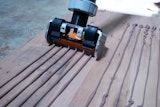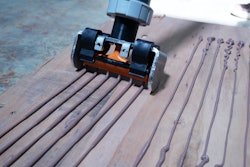Three quarters of all ipé from the top-producing region in Brazil may have been harvested illegally, according to a study from Chalmers University of Technology in Sweden.
The slow-growing species is valued for its hardness and often used to build wooden decks in North America and Europe, as well as being used for wood flooring. The Chalmers study mapped areas and supply chains that faced the greatest risks of illegal logging, and noted Pará, the top-producing state for ipé in Brazil, faced major risk, Phys Org reported.
"In the study, we see, for example, that 16% of the ipé that ends up on the market is harvested without proper permits, and that landowners claim that they have felled more ipé on their land than is likely to exist on the stated area,” said Caroline S.S. Franca, lead author of the study. “We also show that there is more wood in circulation than the official production figures indicate.”
Brazil is responsible for producing 96% of all ipé on the market. Over the past 10 years, the country’s exports of the species have increased by over 76% in volume.























